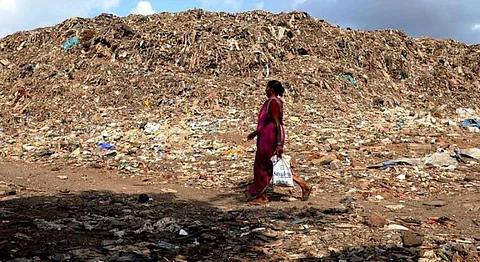
- HOMEGROWN WORLD
- #HGCREATORS
- #HGEXPLORE
- #HGVOICES
- #HGSHOP
- CAREERS
- ABOUT US
- CONTACT US

Back in 2019, before the world knew nothing of a pandemic or skeptical physical interactions, Tamil director, Halitha Saleem created a tender and endearing anthology of short films under the title, Sillu Karuppati (Life is a box of chocolates). The film which has jubilant, unrehearsed, and accidental affection at the core of it delves into the lives of common people ranging across gender, age, and social standing who chance upon one another in sweet, innocent storylines.
The first tale, The Pink Bag is a wholesome narrative of children living in Chennai’s urban landfills; large mountains of the city’s waste that are a frequent spot of exploration for its residents. From celebrating birthdays using waste wrappers and decorations to unearthing unsaid stories of people from their discarded objects, the story is a heart-breaking and innocent exploration of lives that are not spoken of.
A few hundred kilometres away in Mumbai’s Deonar Landfills, the lives of the community living amongst its dump yards are no different. Their lives are not tinged by a sense of romanticism that films tend to add in but there are very distinct narratives and voices that emerge from these forgotten lives.
These large mountains of garbage make for India’s dark underbelly that represents the fallacies of modern city infrastructure. The 12 million citizens of Mumbai collectively tend to generate over 9000 metric tonnes of waste every day. The waste makes its way into the 134-acre dump yard where over time, large mounds of garbage pile on, representing a morbid image of the modern urban landscape.
Some of these ‘garbage mountains’ scale up to a standing equivalent of a 20 storey building, making these large, unkempt hillocks a site for scavenging by the neighbouring slum communities.
Pungent smells, septic water, and frequent fires breed a toxic living environment for the slum communities living within closer quarters of these dump yards. As per a documentary report published in 2009, the life expectancy at these dump yards is capped at 39 years, which is nearly half the figure of living anywhere else in India.
Lukewarm efforts by officials to curb the menace of unmanaged waste have been a failure so far and these large, grotesque structures continue to stand tall in all their glory.
Mountain Tales: Love and Loss in the Municipality of Castaway Belongings
Author and activist Saumya Roy set out on an expedition to document the lives of the communities surrounding these dump yards in 2013 after she chanced upon them during their visits for loans to her micro-finance NGO.
Roy compiles her months-long investigation into her latest book that shadows her implicit critique of the city’s malfunctioning systems placed against the grotesque backgrounds of the trash mountains. Roy distinctly draws two parallels in her story, one that follows those who earn their livelihoods from these dump yards and another that views the mountains of garbage itself as a central character to drive the story forward.
There are moments of solidarities, epiphanies and even tragedies that follow the individual characters of Roy’s narrative. It is in these moments that the gravity of their living condition is really heightened and brought to fore.
You can purchase Roy’s book here.
In the latest developments on the waste management front, the BMC has filed an affidavit seeking an extension to continue dumping the cities wastes in the same landfill up until 2023. This extension was requested keeping in mind the amount of time it would take to convert the waste into energy production units.
If you enjoyed reading this, we also suggest:
